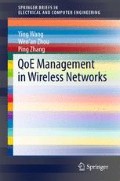Abstract
In this chapter, we propose a systematic architecture on data-driven personalized QoE management. A framework of the QoE management architecture is firstly introduced, which consists of two modules namely (1) training module and (2) control module. We also depict two models for the prediction of user preference, including Bayesian Graphic Model and Context Aware Matrix Factorization Model. A preliminary use case is deployed to demonstrate and evaluate the proposed architecture. Simulation results illustrate the superior performance of proposed architecture compared with traditional water-filling method.
Access this chapter
Tax calculation will be finalised at checkout
Purchases are for personal use only
References
Encyclopedia. Youtube. http://en.wikipedia.org/wiki/youtube/.
D. Zhengyu, S. Jitao, and Changsheng X. “Personalized video recommendation based on cross-platform user modeling”. In Proc. of IEEE International Conference on Multimedia and Expo (ICME), America, July. 2013.
S. Kisoon, M. Aekyung, and C. Yongil. “A case study of context-aware personalized services on IMPACT platform: Adsonmap services”. In Proc. of IEEE International Conference on Advanced Communication Technology (ICACT), Ireland, Feb. 2009.
Z. Hua. “Construction of a Personalized Service Oriented Learning Resource Management System Framework”. In Proc. of IEEE International Workshop on Knowledge Discovery and Data Mining (WKDD), Saudi Arabia, Jan. 2008.
Y. Wang, P. Li, J. Lei, Z. Su, N. Cheng, X. Shen, and P. Zhang. “A Data-Driven Architecture for Personalized QoE Management in 5G Wireless Networks”. In IEEE Wireless Communications. IEEE.
OpenID. http://www.openid.net.
Y. Wang, P. Li, H. Tao, R. Meng, and J. Liu. “Bayesian graphic model based user preference prediction for future personalized service provisioning”. In 2015 IEEE/CIC International Conference on Communications in China (ICCC), pages 1–6. IEEE, 2015.
J. Liu, Y. Wang, and H. Tao. “An improved matrix factorization model under multidimensional context situation”. In 2015 IEEE/CIC International Conference on Communications in China (ICCC), pages 1–6. IEEE, 2015.
Author information
Authors and Affiliations
Corresponding author
Rights and permissions
Copyright information
© 2017 The Author(s)
About this chapter
Cite this chapter
Wang, Y., Zhou, W., Zhang, P. (2017). Architecture of Data-Driven Personalized QoE Management. In: QoE Management in Wireless Networks. SpringerBriefs in Electrical and Computer Engineering. Springer, Cham. https://doi.org/10.1007/978-3-319-42454-5_3
Download citation
DOI: https://doi.org/10.1007/978-3-319-42454-5_3
Published:
Publisher Name: Springer, Cham
Print ISBN: 978-3-319-42452-1
Online ISBN: 978-3-319-42454-5
eBook Packages: EngineeringEngineering (R0)

